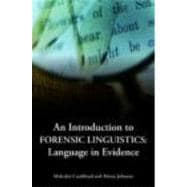
| Acknowledgements | p. xi |
| Introduction | p. 1 |
| Introduction - falsification, plagiarism, trademarks and hoax | p. 1 |
| A brief history of forensic linguistics | p. 5 |
| On forensic discourse analysis | p. 7 |
| Organisation of the book | p. 8 |
| Reading and research tasks and how they function | p. 9 |
| The language of the legal process | p. 11 |
| Approaching a forensic text | p. 13 |
| Introduction | p. 13 |
| Approaching a forensic text - discourse and text analytic tools for forensic contexts | p. 14 |
| The texts | p. 17 |
| Text analysis | p. 24 |
| Some contrastive observations on the texts | p. 32 |
| Conclusion | p. 33 |
| Further reading | p. 33 |
| Research tasks | p. 34 |
| The language of the law | p. 35 |
| Introduction | p. 35 |
| Legal style and register | p. 37 |
| Ordinary and special meanings | p. 46 |
| On applying the law | p. 48 |
| Conclusion | p. 50 |
| Further reading | p. 51 |
| Research tasks | p. 52 |
| Legal genres | p. 54 |
| Introduction | p. 55 |
| Defining 'genre' - functional hybridity | p. 55 |
| Legal contexts | p. 62 |
| Conclusion | p. 68 |
| Further reading | p. 69 |
| Research tasks | p. 69 |
| Collecting evidence: calls to the emergency services and first encounters with witnesses and suspects | p. 71 |
| Introduction | p. 71 |
| First encounters - calls to the emergency services | p. 72 |
| Policespeak, lawyerspeak and listening | p. 76 |
| Police interviews - from talk to text and text to talk | p. 80 |
| Police interviews and social interaction | p. 82 |
| Vulnerable witnesses - on interviewing children and rape victims | p. 87 |
| Conclusion | p. 93 |
| Further reading | p. 93 |
| Research tasks | p. 93 |
| Order in court | p. 95 |
| Introduction: into the courtroom | p. 95 |
| The trial as a complex genre | p. 96 |
| Two discourse types: narrative and question-answer | p. 97 |
| Witnesses and evidence in trials | p. 111 |
| Conclusion | p. 116 |
| Further reading | p. 117 |
| Research tasks | p. 117 |
| Language as evidence | p. 119 |
| The work of the forensic linguist | p. 121 |
| Introduction | p. 121 |
| Morphological meaning and phonetic similarity | p. 121 |
| Syntactic complexity in a letter | p. 123 |
| Lexico-grammatical ambiguity | p. 124 |
| Lexical meaning | p. 125 |
| Pragmatic meaning | p. 128 |
| The recording of interaction in written form - police interview notes | p. 132 |
| Narrative analysis of a disputed statement | p. 135 |
| The challenges for non-native speakers | p. 137 |
| Conclusion | p. 142 |
| Further reading | p. 142 |
| Research tasks | p. 142 |
| The work of the forensic phonetician and the document examiner | p. 144 |
| The work of the forensic phonetician | p. 144 |
| Transcription | p. 144 |
| Speaker profiling | p. 148 |
| Speaker identification by professionals | p. 148 |
| Voice line-ups and Naive Speaker Recognition | p. 152 |
| The work of the document analyst | p. 156 |
| Conclusion | p. 159 |
| Further reading | p. 160 |
| Research tasks | p. 160 |
| Idiolect and uniqueness of encoding | p. 161 |
| Introduction | p. 161 |
| Early interest in authorship attribution | p. 163 |
| Cusum | p. 167 |
| Specific analyses | p. 169 |
| A case report | p. 173 |
| Conclusion | p. 180 |
| Further reading | p. 180 |
| Research tasks | p. 180 |
| On textual borrowing | p. 184 |
| Introduction | p. 184 |
| The history of plagiarism | p. 185 |
| Universities and plagiarism | p. 186 |
| Do people repeat themselves? | p. 191 |
| The evidential value of single identical strings | p. 196 |
| Coda | p. 198 |
| Further reading | p. 198 |
| Research tasks | p. 198 |
| The linguist as expert witness | p. 200 |
| On being an expert witness | p. 200 |
| Expressing opinions | p. 201 |
| Admissible evidence | p. 207 |
| Consulting and testifying as tour guides | p. 210 |
| Conclusion | p. 215 |
| Further reading | p. 215 |
| Research task | p. 215 |
| References | p. 216 |
| Index | p. 232 |
| Table of Contents provided by Ingram. All Rights Reserved. |
The New copy of this book will include any supplemental materials advertised. Please check the title of the book to determine if it should include any access cards, study guides, lab manuals, CDs, etc.
The Used, Rental and eBook copies of this book are not guaranteed to include any supplemental materials. Typically, only the book itself is included. This is true even if the title states it includes any access cards, study guides, lab manuals, CDs, etc.